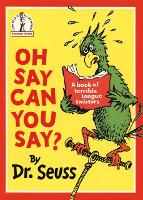|
|
literary criticism & collections
|
|



|
|
| book details |
Oh Say Can You Say? (Beginner Series)
By (author) Dr. Seuss

|
This book is currently unavailable. Enquire to check if we can source a used copy
|
| book description |
This hilarious book of Dr. Seuss tongue-twisters will have children learning to read, and having fun, at the same time! will have children tying their tongues in knots as they try to read aloud the most terrible tongue twisters ever written. They’ll have so much fun they won’t even realise that they’re learning to read at the same time! With his unique combination of hilarious stories, zany pictures and riotous rhymes, Dr. Seuss has been delighting young children and helping them learn to read for over fifty years. Creator of the wonderfully anarchic Cat in the Hat, and ranking among the UK’s top ten favourite children’s authors, Seuss is firmly established as a global best-seller, with over 600 million books sold worldwide. As part of a major rebrand programme, HarperCollins is relaunching Dr. Seuss’s bestselling books, including such perennial favourites as The Cat in the Hat, Green Eggs and Ham and Fox in Socks. In response to consumer demand, the bright new cover designs incorporate much needed guidance on reading levels, with the standard paperbacks divided into three reading strands – Blue Back Books for parents to share with young children, Green Back Books for budding readers to tackle on their own, and Yellow Back Books for older, more fluent readers to enjoy. Oh Say Can You Say? belongs to the Green Back Book range. .
| product details |
Normally shipped |
Publisher | HarperCollins Publishers
Published date | 8 Aug 1991
Language |
Format | Paperback / softback
Pages | 48
Dimensions | 225 x 163 x 3mm (L x W x H)
Weight | 107g
ISBN | 978-0-0017-1337-6
Readership Age |
BISAC | juvenile nonfiction / literary criticism & collections
| other options |
|
|
|
To view the items in your trolley please sign in.
| sign in |
|
|
|
| specials |
|
|

|
Carlo Rovelli
Paperback / softback
208 pages
was: R 295.95
now: R 265.95
|
|

|
Carlo Rovelli
Paperback / softback
224 pages
was: R 295.95
now: R 265.95
|
Originally published in Italian: L'ordine del tempo (Milan: Adelphi Edizioni, 2017).
|
|
|
|